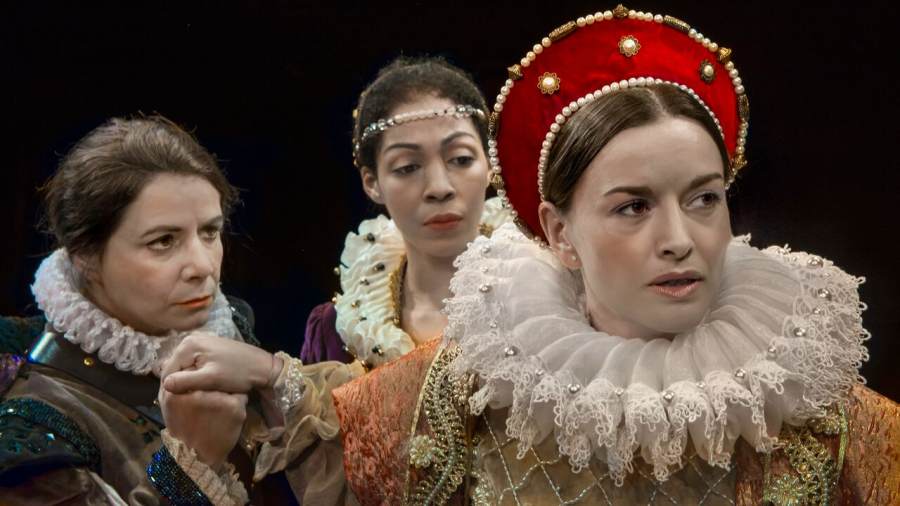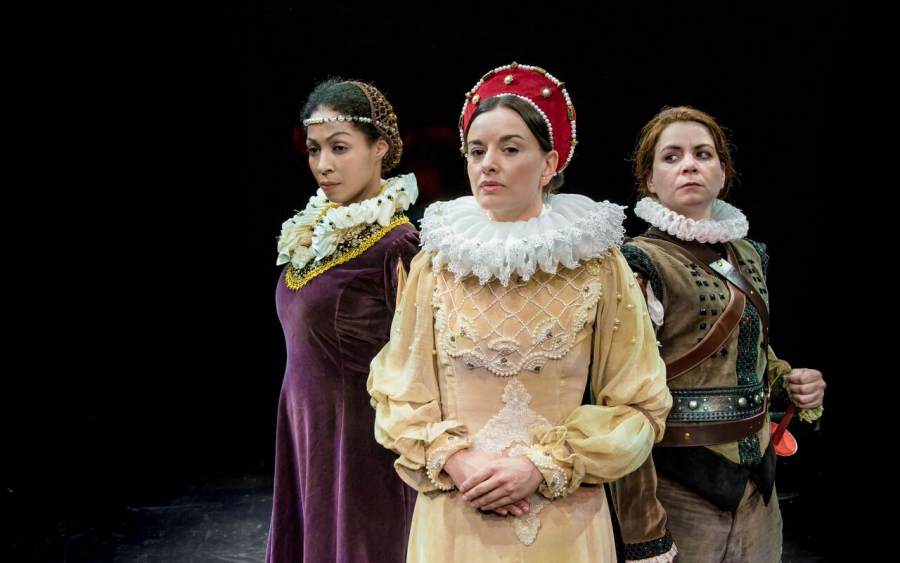

Repertorio Español, in celebrating its 50th anniversary Off-Broadway season, is giving its audiences a rare treasure -- a 375-year-old treasure from Spain's Golden Era. The play Valor, agravio y mujer (Courage, Betrayal and a Woman Scorned), written by Ana Caro Mallén de Soto, pokes fun at the Don Juan myth and its power -- or lack thereof -- over a woman's destiny. We sat down with director Leyma López and lead actress Zulema Clares to gain insight into the play and its rather surprising relevance today.
Leyma, Valor, agravio y mujer is described as a “comedy of honor.” Describe the play and why you chose this play, now 375 years after Ana Caro wrote it. How is it timely to people nowadays?
Leyma López: Valor, agravio y mujer (Courage, Betrayal and a Woman Scorned) talks about honor, love and daring, the situation of women, revenge, among other topics of that time. Honor is one of the most popular themes on the Golden Age theatre. The heroine in this story pursues the character of Don Juan, who dishonored her, motivated by his abandonment. She takes an unknown path, usually dominated by men, and decides to wear male cloths to show, as an individual, that she has courage, intelligence and cleverness to conquer. She uses an emotional and physical battle to pursue her ultimate victory.
The author was recognized as a head of her times, when women had difficulty expressing themselves publicly. That is the primary reason why I chose this play. It is very interesting to see how Ana Caro treats the character of Don Juan, stripped of his amorous conquests, regretting his actions, so as to see him at the end as being a human being, moving away from the famed stereotype.
I also chose this play because the audience can find a lot of themes recognizable nowadays. Today, we have tendencies to discriminate people by their ideology, and the differences between people, and I think that in this work the idea that stands out is the one that tries to unify, to give equality and to weigh ones options to obtain what one desires. That’s why I think that the audience can see a human being in the protagonist, Leonor, who never underestimates herself because of her gender. She knows that nothing would be impossible to achieve.
As the lead character in Valor, agravio y mujer, Leonor is the figure of a person that is guided by optimism, thinking “Yes, you can do it, anything."
Zulema, what were the biggest challenges in playing the story’s lead character, Leonor? Is she always strong enough to solve her problems without the help of a man or is that a surprise to her?
Zulema Clares: There were many challenges and still are, every discovery becomes a new challenge and vice versa. The process never ends, I am still trying to discover the mysteries of the verse, going through every skin that Leonor/Leonardo wears in her/his odyssey. That demands a lot of camouflages and serenity as well, therefore, a lot of rehearsal.
Now, my biggest challenge is to make Leonor heard and seen in every woman, and every man. The story reveals; and no, Leonor is not surprised at all. It’s not that she has or hasn’t enough strength, but that she creates what she wants, she doesn’t suffer it. She is intellectual, she thinks and executes sharply, and she is fully capable.
Leyma, what do you look for in a script that makes you say, ‘I want to direct that play!’?
Leyma López: In a script, I look for points of convergence with things going on in the present and how relevant these points are today. If I detect an interesting story that allows the public to identify itself, I already have a good beginning. Once, I read someone who said "interest is presumption and not unfamiliarity." This has helped me a lot so far.
Today, I live in the United States, so I do theater here. Although Spanish is not the first language in the country, its usage is growing fast. Repertorio has a varied audience, to whom I have to communicate a story. Recently, I have been researching women dramatist of the Spanish Golden Age, from which emerged a cycle of readings and subsequently the production that is currently running. My focus is on unraveling the text and identifying the codes of the word in verse and connecting them in some way with the codes of the current theatrical language, so that it is accessible to the general public. I always work to make this experience entertaining.

Zulema, if anything, what could women – and men, for that matter – learn from this play and/or Leonor?
Zulema Clares: This play makes women remember who we are, more than teach us anything new. The staging is a mirror for the audience, and as a great piece, it portrays us as the individuals we are, with our social masks, caprices, solitudes and passions. It is very present.
I think that the mere fact that Courage, Betrayal and a Woman Scorned reaches our days being so current shows that gender distinctions have no real basis or meaning.
Where do Leonor and Zulema collide and become the same person? In other words, what is it about Leonor that you completely understand and empathize with?
Zulema Clares: I feel a great admiration for the character of Leonor. I think she is an ideal being more than a real one. She is a sublimation of the human being that manages to complement herself, to be conscious, to dominate her weapons, to recognize herself in her feminine and her masculine. Her mind does not have gender, it is complete in itself. How wouldn’t I be identified with such freedom? We agree on something, Leonor and I: we can achieve what we propose.
Leyma, your background is in arts directing and education in Cuba. How is life as a theatre artist different in Cuba than in New York City?
Leyma López: In Cuba, as a creator and director of my own group, I never knew what a pre-production was, or a stage manager, for example. I left Cuba young, before belonging to any professional company endorsed or supported by the Ministry of Culture or other entities that are committed to the arts. Then I chose to work in unconventional spaces, because I am from the countryside and there are no theater spaces at all. My shows were presented mainly in the outdoor spaces. I did not enjoy or know the privileges of having access to the internet, nor did I charge as a director: I only received my corresponding payment for the pedagogic part. New York has been more than different, something new, unknown. Here, I teach Spanish and I'm still a director currently in Repertorio Español, but with another difference: directing in a conventional theater. I have learned about their operation as being part of the company, and then I have experienced what it is to work with a deadline. The confrontation of cultures makes the performance much more extensive and committed to obtain an accesible result to a greater number and variety of audiences.
If you could change anything in the New York theatre and arts scene, what would it be?
Leyma López: We are all in a constant state of transformation in all aspects, and that does not exclude the theater. However, I would not change the New York theater scene as such, but would bring more connection, exchange and relationship between theater companies in English and Spanish.
Zulema Clares: There is so much diversity in theatre and arts scene in New York City that it is hard to add anything more. I would like there would be much more communication between all the parts that make up this theatrical panorama, to facilitate the interaction between us the theater people, to create artistic links between all the New York companies without distinctions or voices, since theater is universal.